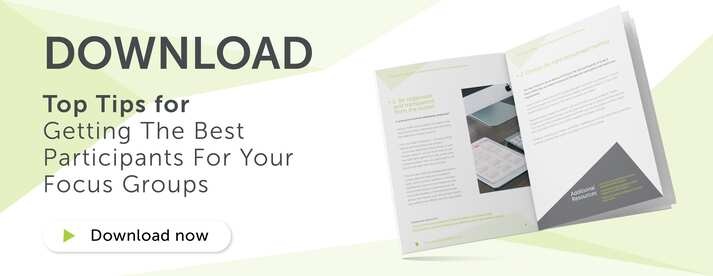
How to reduce no-shows for your qualitative fieldwork
It’s the day of your qualitative fieldwork that you have been planning for weeks. You’re at the location, you’re prepared, and you’re ready to talk to the participants. But now you have to face the question: Will everybody show up? How many of your scheduled participants will actually appear is simply not something you can ever be 100% certain about. However, if you follow the advice below, you should see a lower rate of no-shows at your focus groups and other qualitative fieldwork studies.
Ways to Reduce No-Shows at your Focus Groups
Analyse previous qualitative fieldwork
There’s no teacher like experience. Learn from your mistakes by examining a previous study that had a significant number of no-shows. This can help you gather some insights that will ultimately help you combat problems with no-shows.
For instance, you may discover which types of recruits are more likely to drop out. You also may learn what preparation tactics work best for encouraging participants to reliably show up. These are the kinds of lessons that help you fix and tweak the study so that you are able to get the best possible results and reduce the likelihood of no-shows and drop-outs.
Give them all the details upfront
When recruiting, make sure the participants are well-informed about what your qualitative fieldwork is all about, what they can expect the experience to be like, how long it will take to complete, why you need them to take part and anything else that may seem relevant.
Ask them if they have any questions and be descriptive and upfront with your answers. The more your participants know about the nature of the study and its objectives, the more interested and invested they will be in it. On the other hand, the less they know, the less they’ll care about helping you with your qualitative research.
Make sure to supply detailed information about the location that they will be going to. Is it centrally located, or will they need to travel? If they need to travel, inform them of the distance and cost. If the location is rather far, providing a travel reimbursement is a good way to encourage them to make the trip.
Offer them a map with directions if possible, and make your contact information available in case they get lost on the way and need some help. You may also want to test out the route yourself in advance to confirm the directions are correct.
Make the participants feel special
Be sure to let your participants know how important they are to the study. It may sound like a cliché, but people like to hear that they are needed. If they’re under the impression that their presence won’t make a difference, they may fail to show up if they suddenly find themselves busy or not in the mood to attend the research. If you have already made it clear that you are counting on them to be there and looking forward to hearing what they have to say, a no-show is less likely.
Be engaging
This is certainly very important when you’re speaking with the participants directly during the interview, but it is also something you should be thinking about in your earliest interactions with the participants. The way that you approach recruits and tell them about the study should effectively communicate to them that this is an interesting project that is worth their time. If you are excited about it, it’s more likely that they will be as well! In all communications with them, consider the tone of voice you take.

Being agreeable and considerate when speaking with them can go a long way to developing a rapport and increasing their likelihood of attendance. Also consider using multiple recruiters to call potential respondents to avoid any of the negative effects of recruiter fatigue.
Don’t ask for too much
Be realistic about what you are asking of participants. These are probably busy people with busy lives. If they are taking the time to be a part of your qualitative fieldwork and to share their opinions, remember that you have to respect their time. If respondents begin to get the feeling that they are being asked to commit a lot of time and effort for very little reward, they may not attend the interview.
So during your early communications with them, don’t act too fussy or demanding, and make sure they understand that you value their time and their contribution. This includes when you are taking them through the screener and verification questions, try and keep this to a minimum – we recommend five minutes maximum for this part otherwise respondents may become disengaged and you won’t get the most from their answers.
Offer an incentive
One sure way to show that you truly do value the participants’ time is to offer an incentive. Not only is this going to make potential participants more enthusiastic about taking part, but, knowing that they will receive the incentive on the day of the study will also significantly reduce the chance that they’ll be a no-show. Incentives can come in a variety of forms, whether it’s a cash amount, a cheque or a voucher. Be sure that the value of the incentive matches the amount of time and work that you’re asking of your recruits. If the incentive doesn’t seem worth much, they could still decide to drop out at the last-minute.
Be smart about tailoring your incentives to the respondent demographic that you are targeting. For instance, for a retail study, you might want to offer a shopping voucher. Or if it’s a technology study, a voucher that will go towards a hot new gadget could be very enticing. (But do be sure to remember that you can’t offer a voucher that has to be redeemed at the company that is sponsoring the research – find out more here). Whatever incentives you offer, provide them in a timely manner, as that is key to maintaining your reputation. If participants don’t get them on time, they may spread the word by commenting on Facebook or other platforms, which could tarnish your reputation and dissuade potential future recruits.
If the research lasts for a lengthy period of time or has multiple phases, you could consider offering bonus incentives as a means of promoting continued attendance. For example, you could give them an extra incentive at a halfway point so that they will want to attend for the latter half. It’s also a good idea to give bonus incentives when a respondent gives particularly good feedback on a certain element. This not only promotes better responses, but can also make recruits more eager to attend in the hopes of earning these bonuses.
Keep in touch (but not too much!)
After the initial recruit, you need to be sure to call everyone to confirm their participation in the study. Depending on how much time there is between the confirmation call and the day of the fieldwork, you should also make contact additional times in between so that the participants don’t forget about the study. You may find that email or text messages are a less intrusive way to stay in contact.
But while it is important to be in touch and available to answer any questions they may have, don’t contact them too many times. If you seem overbearing, they may begin to ignore your messages entirely, and once that happens, the possibility that they won’t attend the research increases considerably.
If you need some more useful advice on how to ensure you recruit the best participants for your qualitative fieldwork studies including focus groups; download our guide now:





.jpg?width=500&name=jared-sluyter-342881%20(1).jpg)








